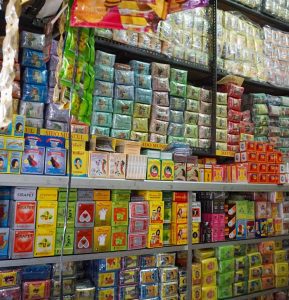PDPOTJI, the Jamu Ambassador for Modern Medicine
"Indonesian jamu should be the master in its own country before being a guest in other countries" (DR. Ingrid Tania, Chairperson of PDPOTJI) "Published by : Farida - 28/05/2021 18:07 WIB
3 Minutes read.
The development of Indonesian jamu has actually been very good to date. During the Covid-19 pandemic in Indonesia, Indonesian jamu was well received by the public. People not only believe in the efficacy of traditional jamu, but also begin to believe in the safety of jamu for consumption. In addition, the public is also consciously seeking various information related to jamu, especially medicinal plants that can be processed into jamu for their own consumption.
However, it does not mean that the journey of traditional jamu is smooth without any problems. Today, competition for traditional jamu in Indonesia is very tight. Moreover, various foreign herbal products also have a special place in the hearts of some people. In an interview with Jamupedia, DR. Ingrid Tania, General Chairperson of Perkumpulan Dokter Pengembang Obat Tradisional dan Jamu Indonesia (PDPOTJI, the Association of Indonesian Traditional Medicine and Herbal Medicine Developers) revealed that foreign herbs have flooded the Indonesian market. In fact, he said that traditional Chinese herbal products were able to dominate the Indonesian jamu market.

Sumber gambar: www.facebook.com
The quality of Indonesian jamu is actually not inferior to traditional herbal medicine from abroad. In fact, Indonesia’s biodiversity for herbal ingredients is more than other countries. In addition, DR. Ingrid also explained that the biodiversity that grows in Indonesia is certainly more suitable for Indonesians because of the similarity of genetics. This is what needs to be echoed to the public to prefer Indonesian jamu to foreign herbal medicine.
Our predecessors have been consuming jamu and various traditional ingredients for generations to maintain a healthy body and treat various types of diseases. Indirectly, traditional Indonesian jamu has been empirically proven to be able to overcome various health problems and its safety is also quite guaranteed.

“However, empirical evidence of efficacy and safety is not sufficient to include jamu in modern medicine. Jamu must continue to improve its quality. This is because the principles of modern medicine are based on scientific evidence. In order to be recognized, the quality of jamu must continue to be improved, one of which is the process of pre-clinical trials to clinical trials. At least, the raw materials for jamu have been standardized like kanpo in Japan,” explained DR. Ingrid Tania.
Dr. Ingrid gave an example that Japan has standardized the raw materials for traditional medicines, both in the form of simplicia and other herbal ingredients. Thus, the percentage of active compounds contained in these ingredients is known. So, these materials will be more stable and constant efficacy. Does not change at any time.
Not only that, DR. Ingrid also added that the Faculty of Medicine in Japan has a mandatory curriculum in the form of kanpo or traditional Japanese medicine and medicine. So, modern Japanese medicine is no stranger to traditional medicine and medicine because since entering medical school they have been equipped with kanpo. They know the safety level of traditional medicine, know its efficacy, how to process it, and have the skills to give kanpo to their patients.
This is certainly different from the Faculty of Medicine in Indonesia. Although many modern medicines have opened up to jamu and medicine, there are also those who are antipathy to jamu medicine. For this reason, PDPOTJI as activists and observers of jamu and herbs always tries to develop jamu and herbs to be accepted by modern medicine circle.
PDPOTJI has several programs, including research, community service, and regulatory efforts for the development of herbal medicine. Research conducted by PDPOTJI in the form of clinical trials of traditional medicines and herbs. This is done to obtain scientific data related to the active compound, efficacy, and safety level.
The next PDPOTJI program is to provide education to the public regarding jamu and herbs. In addition to providing education to the public, PDPOTJI also provides counseling to owners of the home-based traditional jamu industry, either directly or through online media such as Instagram and webinars.
PDPOTJI also seeks regulations on jamu and herbs in order to have a positive effect on the development of Indonesian jamu. Regulatory steps taken by PDPOTJI are carried out so that doctors can provide herbal or jamu to their patients as a form of treatment.
If herbal or jamu is already acceptable to the community and doctors, it is very likely that Indonesian jamu can become a master in their own country and deserve to be a guest in other countries. In fact, Indonesian jamu can compete with TCM in China, ayurveda in India, or ginseng in Korea.








